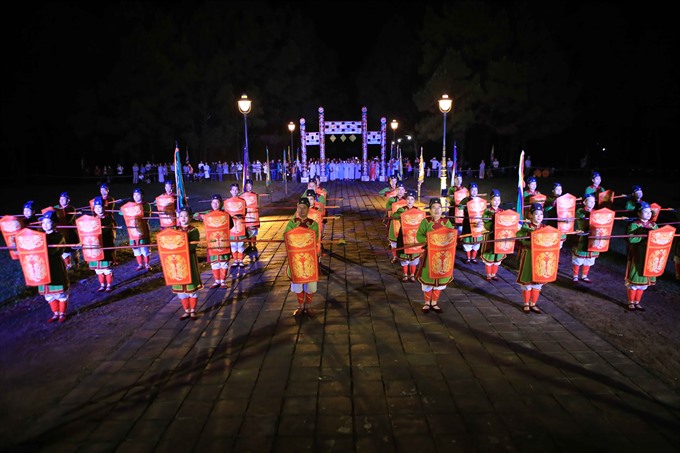 Life & Style
Life & Style

Early morning on Friday, Huế held a worshipping ceremony at the platform used by kings under the Nguyễn Dynasty (1802-1945) to offer prayers to the gods during spring.
 |
| Nguyễn Dung (in yellow costume), chairman of the provincial People’s Committee, chaired the ceremony on Friday morning. VNS Photo Hồ Cầu |
THỪA THIÊN-HUẾ — Early morning on Friday, Huế held a worshipping ceremony at the platform used by kings under the Nguyễn Dynasty (1802-1945) to offer prayers to the gods during spring.
Huế Monuments Conservation Centre, the local government body that manages all relics built by the dynasty in Huế, recreated the imperial prayer ceremony. While the offerings and process remained the same as those during the time of the kings, the ceremony chairman was represented by local government officials.
A young buffalo, a goat and two pigs were sacrificed at the ceremony. Other offerings included tea, wine, fruit and local cakes. The rituals were accompanied by royal court music and were conducted at the two top layers of the Nam Giao platform.
The platform was built on 10ha of a hilly area in 1806 by the dynasty’s first king, Gia Long. It comprises three layers: a round layer at the top representing heaven, a square in the middle representing earth and the bottom layer representing humans.
The platform includes buildings for storage of prayer tools and kitchen utensils and a shelter house for the kings.
Prior to the ceremony, the kings followed a vegetarian diet. The ceremony was held to pray for peace, favourable weather and bumper crops. It was considered the most important ritual in the country during the imperial time.
Under the Nguyễn Dynasty, 98 ceremonies were held at the platform, with the first in 1807 and the last performed in 1945.
The platform’s top layer was damaged due to the construction of a war memorial built by the local authorities. It was restored and conserved in 1994, a year after all the monuments of the dynasty were recognised by UNESCO as world heritage.
The conservation centre held the re-enaction ceremony for the first time in 2006 and made it a part of the biennial Huế Festival, complete with a re-enacted royal procession of an acting king (played by an actor) travelling on elephants.
In 2008 and 2010, the acting king chaired the ceremony. In 2014 and this year, local officials played the role of the chairman. The local people and researchers had opposed both actors and officials. They said the actors would give an unreal touch to the ceremony while officials, who were members of the Communist Party, were believed to be atheists. — VNS
 |
| Acting soldiers at the ceremony. VNS Photo Hồ Cầu |




